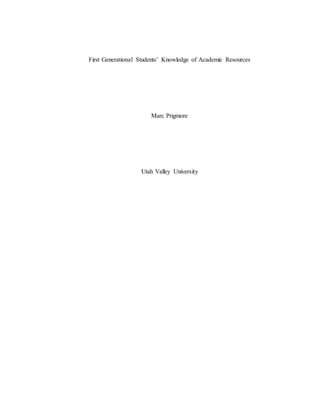
BESC 4040 - Group Paper
- 1. First Generational Students’ Knowledge of Academic Resources Marc Prigmore Utah Valley University
- 2. Comprehending the technical terms and processes of college enrollment can be challenging for anyone; and is especially challenging for first generational students. First generational students are students whom both parents did not receive bachelor’s degrees. It is common for these students to not be exposed to the general college processes which other adolescents and young adults. The questions we are posing is does UVU effectively help these first generation students and are these students aware of the resources available to them? Were they able to understand the process of a college application and the financial aid forms? Are they able to understand this terminology? To answer these questions, our team created a six-question survey to be administered to both first generation, and non-first generation students. Every semester the UVU Institutional Research and Information Department sends an email to approximately 10,000 randomly selected UVU students, inviting them to participate in the omnibus survey. Questions typically include topics about their experience at UVU, the opportunities and resources they have taken advantage of, and other relevant information. The Institutional Research and Information Department agreed to publish our survey in the fall 2015 omnibus survey. Since the information we were seeking was largely quantitative, and less personal in nature, it was appropriate to collect data through such a method. An advantage of using the survey method of data collection is that the survey was very easy to develop, the results are quick to analyze, and the time expended to take the survey is very short. It is also very cost effective and can be done from anywhere with internet access. The limitations of doing a survey in this manner include the lack of personal contact; therefore, if participants felt the need to expound or explain, they did not have the opportunity to do so. Additionally, the omnibus survey is sent to every possible type of student, and this may include
- 3. current high school students participating in the concurrent enrollment program (UCAS). Obviously concurrent enrollment students would not have insights relevant to our desires in knowing about the experiences of current college students. There is also the potential problem of survey fatigue; however, we hoped to minimize this effect by using the smallest number of questions possible. Finally, participants may not understand the purpose of the questions or the desired application, and therefore may leave out relevant information simply due to lack of awareness. The process of collecting the data was relatively simple on our part. After finalizing the questions we wanted to include in the survey, we sent them to the Institutional Research and Information Department. At the beginning of November the omnibus survey was sent out to approximately 10,000 random students via their email address. Approximately three weeks later the survey was closed and the IRI Department provided us with the results to the questions we had included. Over 500 participants responded to the survey. Using SPSS we were able to analyze the various responses and insights given through the survey. The results of the survey provided some interesting and useful information that UVU can use to better accommodate their students. When asked which resources were most helpful in accomplishing both of these tasks, the majority of non-first generation students reported their parents being most helpful. 56.6% of non-first generation students said their parents were most helpful in their choice of which college was right for them, and 65.6% of them reported parents as most helpful in helping them know the steps to take in order to attend that college. First generation students also reported their parents as the most helpful in accomplishing these tasks; however, they did so at a much smaller rate -- 34.5% and 39.6% respectively.
- 4. The goal of this project was to gain insights about the enrollment processes of first- generational students. The team set out to discover whether or not first generation students knew of available resources at Utah Valley University and if they knew how and when to utilize those resources. The team devised a survey which addressed the specific questions asked. The data gathered is an accurate representation of the hypothesized results. Some specific research questions asked were: “What resources here at UVU do you feel are most helpful in providing you with a successful college experience? Please indicate your level of awareness of support resources available to help you as a student here at UVU. When did you feel you had a workable understanding of the following terms or processes? (List terms, such as bursar’s office, syllabus, etc). The results yielded great information about the process both first-generational and traditional students go through when beginning at UVU. The team speculated parental support being the main system of support for traditional students, and the team was surprised to find that 34.5% of nontraditional students reported their parents as their main system of support. One recommendation to be made from this research is proposing new ways to increase the 34.5% into a majority percent similar to traditional students. A remaining question in the future is how well was canvas explained to the student? Canvas is the primary portal students use to complete and submit assignments. The majority of teachers post syllabi and other important announcements on canvas and it is imperative new students know how to navigate the software. The team successfully studied the intended demographic. The survey produced effectively gathered data which can be used for future protocol at UVU regarding nontraditional students. UVU has the goal of ensuring every student is completely informed of anything involving UVU. It is through this research and future research that this goal is made possible.